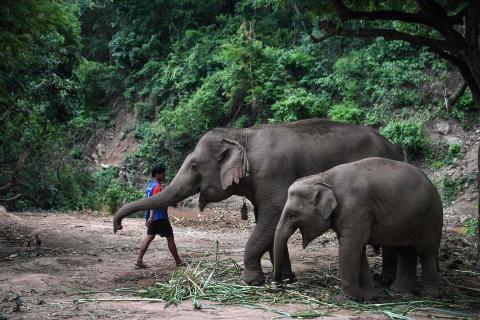Thai elephants' mass migration to village brings new stress

A thousand elephants threatened by starvation have journeyed through the hills of northern Thailand, making a slow migration home from tourist sites forced shut by the pandemic.
Home for some of the animals is the northern village of Huay Pakoot, where generations of ethnic Karen mahouts -- or elephant handlers -- have been rearing the giant mammals for four centuries.
But it is around tourist hub Chiang Mai, 180 kilometres (110 miles) away, that many mahouts and their elephants work, performing money-spinning tricks for foreigners in amusement parks or "sanctuaries".
Some of the controversial camps employ abusive methods to "break" and train the elephants, who earn their keep by entertaining busloads of tourists eager for a once-in-a-lifetime experience.
As the coronavirus pandemic paralysed global travel and closed many of the parks in mid-March, however, Thailand's some 3,000 domesticated elephants have been unemployed. Many -- at risk of starvation -- have been brought home.
"They are tired but rather happy," Chaiyaporn, a mahout of 15 years told AFP, after they arrived in Huay Pakoot.
"They have a very good memory. It seems that after years of absence they know they are finally coming home," the 35-year-old said.
About 1,000 elephants and their mahouts have returned to their villages in the past two months, said Theerapat Trungprakan, president of the Thai Elephant Alliance Association.
"Such a big migration over such a short period of time is unprecedented in this country," he said.
But the homecoming is not without problems.
Huay Pakoot normally has fewer than 10 elephants in it. Today, more than 90 are living alongside 400 villagers. <...
- Log in to post comments










